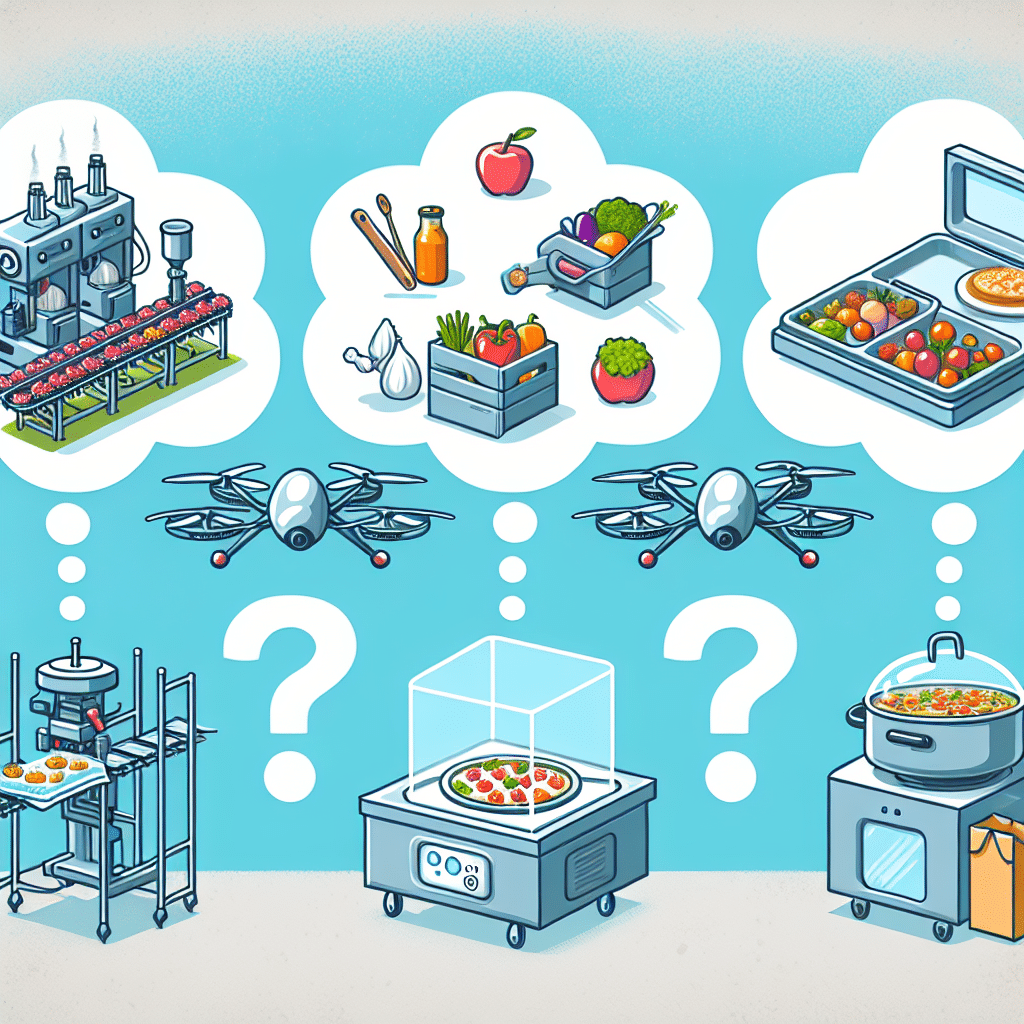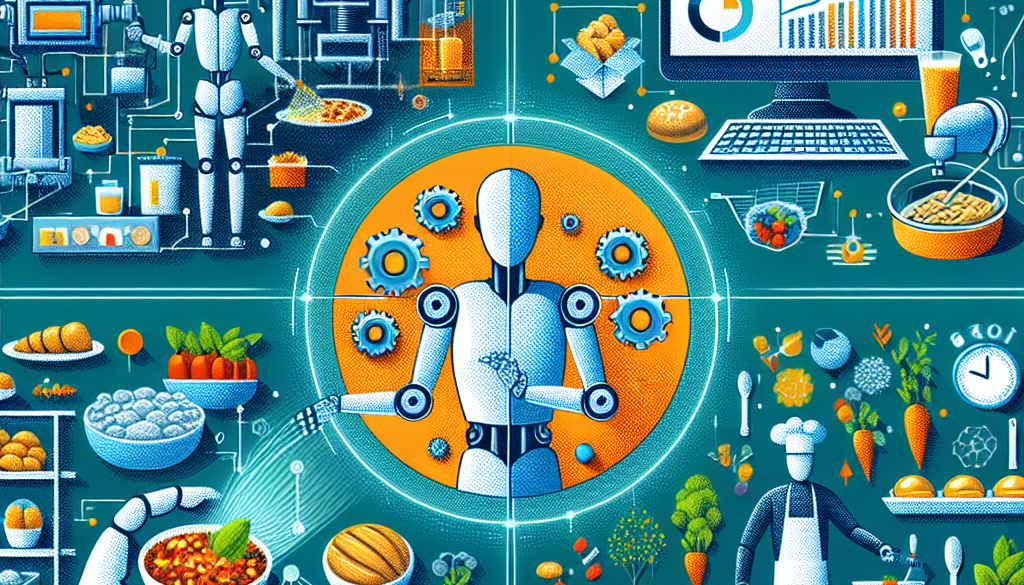Top 3 Automation Questions Facing the Food Industry
-
Table of Contents
- Automation in the Food Industry: Top 3 Questions to Consider
- 1. How Can Automation Improve Food Safety and Traceability?
- 2. What is the Impact of Automation on Labor and Employment in the Food Industry?
- 3. How Will Automation Affect the Cost and Efficiency of Food Production?
- Conclusion
- ETprotein: Enhancing Food Industry Automation with High-Quality Protein Products
Automation in the Food Industry: Top 3 Questions to Consider

The food industry is undergoing a significant transformation, with automation playing a pivotal role in shaping its future. As technology advances, businesses within this sector are increasingly turning to automated solutions to enhance efficiency, reduce costs, and improve food safety. However, the integration of automation raises several critical questions that industry leaders must address to ensure successful implementation and sustainable growth. In this article, we will explore the top three automation questions facing the food industry, backed by relevant statistics and insights.
1. How Can Automation Improve Food Safety and Traceability?
Food safety and traceability are paramount concerns in the food industry. Automation offers the potential to significantly enhance these areas by reducing human error and increasing the precision of tracking systems. According to a report by the Food and Drug Administration (FDA), foodborne illnesses affect 1 in 6 Americans each year, underscoring the need for improved safety measures.
- Automated Monitoring Systems: These systems can continuously monitor critical control points, ensuring that food products are kept within safe temperature and humidity ranges throughout the supply chain.
- Advanced Traceability Solutions: Blockchain and other digital ledger technologies can provide an immutable record of a product’s journey from farm to table, making it easier to pinpoint the source of contamination in the event of an outbreak.
- Robotics and AI in Quality Control: Automated quality control can detect and remove defective products with greater accuracy than human workers, reducing the risk of foodborne illnesses.
2. What is the Impact of Automation on Labor and Employment in the Food Industry?
The adoption of automation technologies inevitably leads to concerns about job displacement. The Bureau of Labor Statistics reports that the food manufacturing industry employs approximately 1.6 million workers in the United States. As automation becomes more prevalent, the industry must consider how to manage the transition for its workforce.
- Reskilling and Upskilling: Companies must invest in training programs to help employees adapt to new roles that require working alongside automated systems or managing these technologies.
- Job Creation: While some jobs may be lost to automation, new opportunities in areas such as robotics maintenance, data analysis, and system programming may arise.
- Social and Economic Implications: The industry must work with policymakers to address the broader social and economic impacts of automation, ensuring that workers are not left behind in the transition.
3. How Will Automation Affect the Cost and Efficiency of Food Production?
Cost reduction and efficiency gains are often cited as primary drivers for automation. A study by the Association for Packaging and Processing Technologies indicates that 94% of food packaging operations are using or considering automation. The potential benefits are substantial, but they must be weighed against the initial investment and ongoing maintenance costs.
- Increased Production Speed: Automated systems can operate 24/7 without breaks, significantly increasing production capacity and throughput.
- Reduced Waste: Precision technologies can minimize material waste during production, contributing to cost savings and environmental sustainability.
- Scalability: Automation allows for scalable production processes that can be quickly adjusted to meet changing market demands.
Conclusion
In conclusion, the food industry’s shift towards automation presents both opportunities and challenges. Addressing concerns related to food safety and traceability, labor and employment, and cost and efficiency will be crucial for businesses looking to capitalize on the benefits of automation. By carefully considering these questions, industry leaders can navigate the complexities of integrating automated systems and set the stage for a more resilient and sustainable food supply chain.
ETprotein: Enhancing Food Industry Automation with High-Quality Protein Products
As the food industry embraces automation, the demand for high-quality ingredients that can withstand automated processing and packaging increases. ETprotein is well-positioned to meet this demand with its extensive range of organic bulk vegan proteins and L-(+)-Ergothioneine (EGT). Their products are ideal for automated food production lines, offering neutral taste, non-GMO, and allergen-free attributes, with L-(+)-Ergothioneine purity over 98%, 99%. Whether you’re in the nutraceutical, pharmaceutical, or food and beverage industry, ETprotein’s offerings can enhance your automated processes and ensure top-quality end products. To learn more about their protein solutions and how they can support your automation efforts, contact sales(at)ETprotein.com today.
About ETprotein:
ETprotein, a reputable protein and L-(+)-Ergothioneine (EGT) Chinese factory manufacturer and supplier, is renowned for producing, stocking, exporting, and delivering the highest quality organic bulk vegan proteins and L-(+)-Ergothioneine. They include Organic rice protein, clear rice protein, pea protein, clear pea protein, watermelon seed protein, pumpkin seed protein, sunflower seed protein, mung bean protein, peanut protein, and L-(+)-Ergothioneine EGT Pharmaceutical grade, L-(+)-Ergothioneine EGT food grade, L-(+)-Ergothioneine EGT cosmetic grade, L-(+)-Ergothioneine EGT reference grade and L-(+)-Ergothioneine EGT standard. Their offerings, characterized by a neutral taste, non-GMO, allergen-free attributes, with L-(+)-Ergothioneine purity over 98%, 99%, cater to a diverse range of industries. They serve nutraceutical, pharmaceutical, cosmeceutical, veterinary, as well as food and beverage finished product distributors, traders, and manufacturers across Europe, USA, Canada, Australia, Thailand, Japan, Korea, Brazil, and Chile, among others.
ETprotein specialization includes exporting and delivering tailor-made protein powder and finished nutritional supplements. Their extensive product range covers sectors like Food and Beverage, Sports Nutrition, Weight Management, Dietary Supplements, Health and Wellness Products, and Infant Formula, ensuring comprehensive solutions to meet all your protein needs.
As a trusted company by leading global food and beverage brands and Fortune 500 companies, ETprotein reinforces China’s reputation in the global arena. For more information or to sample their products, please contact them and email sales(at)ETprotein.com today.














